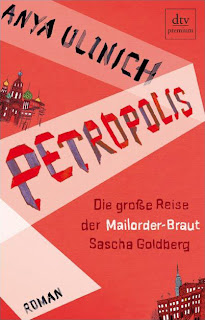Mein Shakespeare hat mit wieder sehr gut gefallen und ich bestelle mir später bestimmt noch ein paar der Komödien.
Heute morgen habe ich mich dann entschieden, mein neues Buch von Barack Obama zu lesen. Eigentlich wollte ich noch einen Roman dazwischen schieben, aber dann war ich doch zu neugierig auf dieses Buch - und wenn ich auch erst gute 50 Seiten gelesen habe, hat es mich bisher begeistert.
Meine neue Lektüre:
Barack OBAMA
The Audacity of Hope
Thoughts on Reclaiming the American Dream
The Washington Post: Why, just two years after being elected to the Senate, has Barack Obama set so many Democratic -- and some Republican -- imaginations on fire? The Illinois Democrat is certainly a magnetic speaker who delivers original phrases in composed yet passionate tones. His life, as told in the powerful memoir Dreams From My Father, seems a model for the globalized future: The only child of a biracial, bicontinental union, he grew up in Hawaii and Indonesia, then went on to become a community organizer in Chicago and the first black editor of the Harvard Law Review. And his athletic good looks have landed him on the cover of a major fashion magazine, with a spread by Annie Leibovitz. Not since John F. Kennedy has a junior senator so quickly become a national celebrity and a possible candidate for the White House.
But what's most impressive about Obama, 45, is an intelligence that his new book displays in abundance. He articulates a mode of liberalism that sounds both highly pragmatic and deeply moral. The Audacity of Hope -- the title comes from a sermon by his Chicago pastor -- trumpets no unifying theme or grand theory about how the American dream will be reclaimed and by whom. Chapters bear such prosaic titles as "Values," "Opportunity" and "Faith." But in a disarmingly modest way, Obama offers a more sensible perspective on "how we might begin the process of changing our politics and our civic life" than his more seasoned Capitol Hill colleagues have provided.
Take the problem of the big money that is indispensable to winning a statewide or national campaign. Unlike most Democrats, Obama does not dwell on the corrupt antics of the convicted lobbyist Jack Abramoff and his friends. His concern is about a more serious and enduring threat to democracy: class inequality. During his own Senate race in 2004, Obama had to spend a good deal of time with "law firm partners and investment bankers, hedge fund managers and venture capitalists." Most of these donors, he acknowledges, were "smart, interesting people" who asked for no specific favors. Still, they couldn't help but express "the perspectives of their class." Their wealth prevented them from understanding loyal members of labor unions, evangelical churches or the NRA. As firm believers in a meritocracy, the donors implicitly denied that "there might be any social ill that could not be cured by a high SAT score." Lawmakers who routinely move in such circles, Obama adds, tend to neglect "the world of immediate hunger, disappointment, fear, irrationality, and frequent hardship of the other 99 percent of the population -- that is, the people that I'd entered public life to serve."
That willingness to criticize his own well-heeled supporters stems partly from Obama's years of work with the working poor. It reflects a desire to transcend accusations and talking points and to offer a fresh look at undeniable but seemingly insoluble problems. Thus Obama agrees with conservatives who argue that teen motherhood and the glorification of "gangsta life" help keep young blacks from escaping the ghetto. But as an African American, he also recognizes each violent criminal as a cousin or brother who was not preordained to go wrong. "African Americans understand that culture matters but that culture is shaped by circumstance," he observes, and the longer policymakers and the middle-class public ignore inner-city poverty or try to explain it away, the more endemic it becomes. To address the problem, Obama recommends a bundle of pragmatic policies that would draw both on public funds and the initiative of local businesses: low-cost child-care centers, neighborhood health clinics, job programs for ex-felons.
Obama's own experiences also help him illuminate the root causes of anti-Americanism abroad. During his time in Indonesia, the archipelago was at the beginning of an oil-generated boom that spread prosperity, unevenly, throughout the islands. The United States had helped install Sukarno, a military dictator, after a bloodbath that claimed at least an estimated 500,000 lives. But once the Indonesian economy collapsed in the 1990s, militant Islamists were able to gain a hearing for their diatribes against modernist culture and American power. For Obama, this new "land of strangers" serves as a lesson about the way that U.S. influence -- cultural, economic and military -- has both uplifted and angered the world, in roughly equal measure. He also points out that most Americans can't find Indonesia on a map.
Throughout the book, Obama strikes similar ethical chords. He credits President Reagan's "clarity about communism" but regrets that it "seemed matched by his blindness regarding other sources of misery in the world." He endorses marriage workshops and shudders at the explicit lyrics of some rap songs, but he opposes legal restrictions on intimate behavior. "Perhaps I just find the ways of the human heart too various, and my own life too imperfect, to believe myself qualified to serve as anyone's moral arbiter," he writes, echoing Jesus's judgment that only those without sin should cast the first stone. Obama's knack for mixing stirring rhetoric about good and evil with practical policy ideas is rare in the modern history of U.S. politics. At times, Franklin D. Roosevelt, Kennedy and Reagan managed the feat. But none of these men wrote his own presidential speeches. Nor did Kennedy or Reagan really write the books that carry their names. In contrast, The Audacity of Hope is clearly Obama's own creation; the rhythms, the self-deprecating humor and the graceful transitions all resemble those in his memoir.
The sentimentality does, too. His book concludes with a vignette that could be entitled "Mr. Obama Goes to Washington." On fine evenings, the senator likes to take a run down the Mall and end up inside the Lincoln Memorial. He reads the two greatest, and perhaps shortest, speeches ever written and delivered by an American president and reflects on Martin Luther King Jr.'s "mighty cadence" that thrilled a massive crowd a century later. "My heart is filled," Obama writes, "with love for this country." The story, like the original by Frank Capra, is a bit hard to believe. (Does the senator really pore over the words of the Second Inaugural and the Gettsyburg Address on every visit?) Of course, the policies Obama favors are far less audacious than Lincoln's destruction of the slave system or King's crusade to abolish the Jim Crow order that replaced it. Still, in our lowdown, dispiriting era, Obama's talent for proposing humane, sensible solutions with uplifting, elegant prose does fill one with hope. Someday, it may even help him get elected president.







































